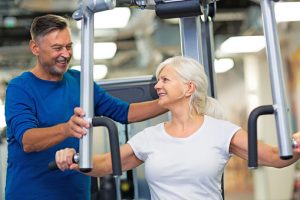 Muscle loss – a condition known as sarcopenia – is a real problem for aging adults. Although you may be more aware of osteoporosis, which is the loss of bone density, sarcopenia is another serious concern for seniors as it weakens the muscle structure of the body and increases the risk of falls and other injuries.
Muscle loss – a condition known as sarcopenia – is a real problem for aging adults. Although you may be more aware of osteoporosis, which is the loss of bone density, sarcopenia is another serious concern for seniors as it weakens the muscle structure of the body and increases the risk of falls and other injuries.
There is no single cause for sarcopenia, so maintaining muscle strength isn’t as easy as just taking a supplement. In physically inactive people, muscle loss begins at mid-life with a five percent decline every decade thereafter. This process is further accelerated after the age of 60.
Advertisement
Lack of exercise isn’t the only cause of sarcopenia. Hormonal changes and dietary imbalances also play a role in the rate of muscle loss.
As you can see, physical activity is particularly important in the old age, but unfortunately, many seniors live a sedentary lifestyle that aggravates the problem. Adding new muscle fibers becomes increasingly difficult in older adults, so combating sarcopenia can be quite a challenge.
Also, seniors often have other conditions that further accelerate muscle loss, including diabetes, cardiovascular disease, and hormonal changes. But the good news is, not only does regular exercise help prevent sarcopenia, but it works to improve other common conditions, too.
A great way to promote muscle growth – in addition to exercising – is to increase protein intake. Extensive research on older adults and protein intake reveals that seniors are at a particular risk for low protein intake, which is a problem as protein is crucial for maintaining muscle mass. In addition, metabolic changes make it far more difficult for the body to produce muscle protein from food. Seniors are recommended to increase their intake of lean proteins from meat and fish as well as from plant-based sources.
Another factor that plays a role in muscle maintenance is vitamin D. Our bodies start producing vitamin D whenever we are out in the sun, but it appears that older adults don’t get that much of sun exposure, which contributes to muscle loss, too. Making a conscious effort to head outdoors or stay by the window more often is then a good idea.
Generally speaking, the best way to prevent muscle loss and keep your body strong is through healthy lifestyle habits. Exercise and a healthy diet are the basics of maintaining muscle mass in the old age. But do keep in mind that the sooner these interventions take place the better it is for preventing serious muscle loss.
